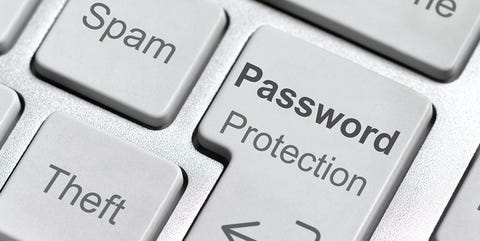How to Open a Security Door Without a Key
Picking passwords to use online can be a minefield. You want something that's easy to remember but at the same time, you need a secure password that ensures hackers can't easily gain access to your online accounts, bank account details and credit card numbers.
According to password manager, NordPass , you should be thinking about using a password such as UGr2@&589YpM or #hS569Uryde*. These two passwords top a list of those that are yet to have been stolen by hackers. Although you should not copy these passwords, as the more times the same password is used on different accounts, the more sites scammers can access fraudulently if they manage to crack it. Instead, you should be creating your own that are as complex. So what are the golden rules for creating complex, secure passwords? The GHI offers its top tips.
Perfect passwords
A strong, secure password should be a combination of uppercase and lowercase letters, numbers and symbols. Ideally, they should be completely random, rather than forming a word of sentence. If you struggle t create random passwords, try using a free online password generator. However, if you struggle to recall these complex passwords, try a random word of phrase, replacing some of the characters with symbols and numbers. So 'purple' could be 'P*r6Le. If in doubt, check how long it takes to crack your password at howsecureismypassword.net.
Consecutive strings of numbers or letters
A string of consecutive numbers, such as 123456, or letters as they appear on a keyboard, for example asdfgh, are some of the easiest passwords for hackers to crack. According to the UK's National Cyber Security Centre (NCSC), which analysed the passwords used on online accounts that had been hacked, more than 23 million people used 123456, making it the most used password that had been stolen. Worryingly, 123456789 was the second most used password on hacked accounts, while password and 1111111 also made an appearance in the top 5 most-commonly used passwords.
Names and sports teams
Some of us are still using resorting to using our own names and favourite teams as passwords too. Ashley was the most commonly used name in passwords that had been hacked (chosen by more than 432,000 Brits). It was closely followed by Michael, Daniel, Jessica and Charlie. While Liverpool was used by 270,000 people whose account had later been hacked.
The problem with using personal facts, such as your name, date of birth, home address or favourite singer or sports team, as a password, is this information is easily accessible on Facebook, Twitter and other social media accounts, meaning hackers will find it easy to crack these passwords. So avoid using any personal information as it's so easily accessible through social networks, electoral rolls etc, it's not going to take hackers long to crack.

Getty
Individual passwords
Almost a third (31%) of Brits are using the same password for both their movie and TV streaming services and accounts that are more sensitive, such as online banking, reports Specops Software. Furthermore, more than three in ten people don't think there's anything wrong with re-using passwords, while 12% admit they've never even considered having the same password for several accounts may be an issue.
But using the same password can lead to serious trouble. If you usernames and password are stolen in a security breach, scammers will then use try these usernames and passwords with lots of other sites. If you've used the same password, they'll have no problems accessing all of your accounts.
Account hacked?
If you think an account has been accessed by hackers, change the password. You should always use a different password for every online account you hold, but if that's not the case and one of your accounts has been accessed, then change any other accounts that use that password too.
If you're unsure if your password has ever been leaked in a security breech, install Google's Password Checkup. This plug-in for the Chrome web browser on a computer (it doesn't work on smartphones or tablets) works in the background and any time you enter a username or password for a website, checks it against a database of four billion leaked account details. It will alert you immediately if it finds a match. All the information it collects about your usernames and passwords is held in an encrypted database, which even Google employees can't access.
Regular changes
Ideally, you should be changing your password for every online account at least once a year. So if your details have been leaked, it reduces the chance that a hacker can gain access to your account.
Password manager
Do you avoid different passwords because you struggle to remember them all? Then try a password manager, such as LastPass, that will create and remember passwords for you – all you need to do is log in to the software, meaning you'll just have one password to remember.
Finally, always protect smartphones, tablets and computers with a password, pin code or lock pattern so that if they are lost or stolen, whoever finds them can't access your personal details.

Vodafone N9 Lite
Vodafone Vodafone
£202.00





Alcatel 1
Alcatel carphonewarehouse.com
£59.99

Nokia 3.1
Nokia amazon.co.uk

Alcatel 1X
Alcatel argos.co.uk
£99.95
Like this article? Sign up to our newsletter to get the GHI newsletter delivered straight to your inbox every week.
SIGN UP

This content is created and maintained by a third party, and imported onto this page to help users provide their email addresses. You may be able to find more information about this and similar content at piano.io
How to Open a Security Door Without a Key
Source: https://www.goodhousekeeping.com/uk/consumer-advice/technology/a576903/how-to-create-strong-passwords/